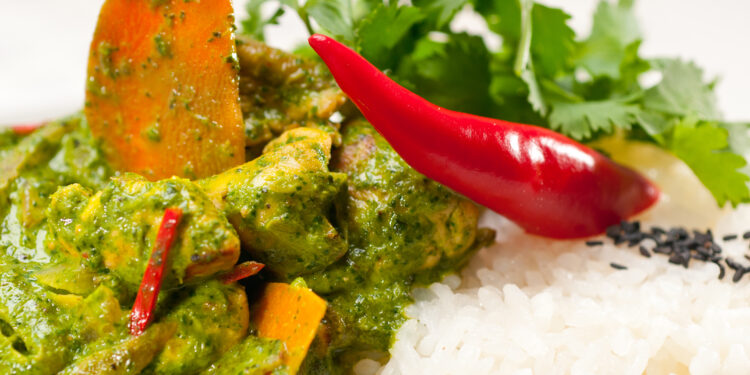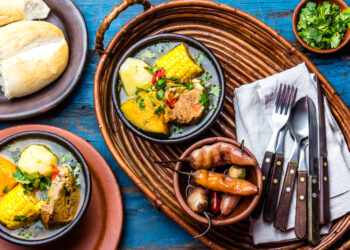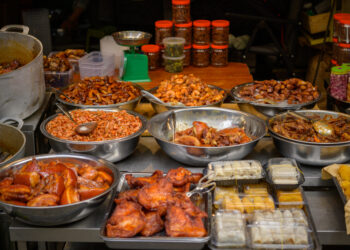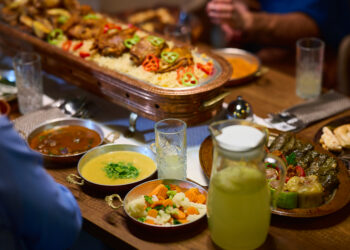Celebrate the joy of Indo-Caribbean Sunday lunch, from curry duck to dal and rice, with stories, spices, and simmering pots passed down through generations.
Sunday Food Traditions aren’t just about what’s on the table, they’re about who’s around it. In Indo-Caribbean homes, Sundays are sacred. Not necessarily in the religious sense (although for many, that too), but in the comforting ritual of food, family, and flavour.
From the bustling kitchen sounds of Guyanese villages to the gentle clatter of iron pots in Trinidadian backyards, Sundays are for cooking the dishes that take time, demand love, and spark storytelling. Whether it’s the robust heat of curry duck, the one-pot wonder of pelau, or the soul-soothing simplicity of dal and rice, Indo-Caribbean Sunday lunch is a full-on celebration of heritage, community, and spice.
Let’s dive spoon-first into the rich food traditions that make Sundays feel like home.
The Heartbeat of Sunday: A Shared Meal That Means More
In many Indo-Caribbean households, whether in Trinidad, Guyana, Jamaica, Suriname, or in the UK diaspora, Sunday lunch is not merely a meal. It’s the highlight of the week. It’s the day when the good cutlery comes out, when children get told “go wash your hand before you touch anything,” and when grandparents hold court from the head of the table.
There’s usually one person orchestrating the kitchen: a matriarch (or sometimes, increasingly, a patriarch) with a recipe book that lives in their head and smells like roasted jeera. Recipes aren’t followed, they’re felt. And the results? Always glorious.
Curry Duck: The Headliner of a Sunday Lime
Curry duck, the highlight of Indo-Caribbean Sunday lunch. Spicy, deeply aromatic, and unapologetically bold, this dish often requires an entire Sunday morning to prepare properly. The duck is usually marinated overnight in green seasoning, garlic, ginger, and curry powder, then slow-cooked until tender, preferably in a cast-iron pot over an open flame.
The real trick? Cooking it outside, with friends and family gathered around, drinks in hand and old chutney or reggae tunes playing softly in the background. It’s not just lunch, it’s a lime (Trini slang for a casual gathering).
And let’s be honest: everyone’s got strong opinions about how curry duck should taste. Some say it needs that bitter edge from burnt curry. Others swear by adding tamarind or coconut milk. But wherever you stand, you know one thing — curry duck means Sunday.
Pelau: One Pot, A Thousand Memories
If curry duck is the star, pelau is the reliable best friend — the one you can count on to feed everyone and still taste amazing the next day.
This Trini staple is a one-pot dish of rice, pigeon peas, and meat (typically chicken or beef), cooked in a rich caramelised base of brown sugar. Seasoned with thyme, garlic, and a generous dose of coconut milk, it’s the epitome of hearty comfort.
Pelau is also a Sunday favourite because of its practicality, it’s relatively quick (compared to curry duck), satisfying, and doesn’t require a full spice cabinet to pull off. It also travels well, making it a perfect pick for beach outings, picnics, or visiting extended family.
Pair it with coleslaw or sliced cucumbers and a splash of hot pepper sauce, and you’ve got yourself a plate of nostalgia.
Dal and Rice: The Unsung Heroes
For many families, especially those with roots in India, Guyana and Trinidad, dal and rice is the comfort-food constant. Simple? Yes. But boring? Never.
Made from yellow split peas, turmeric, garlic, and sometimes jeera (cumin), dal is slow-cooked until creamy and then “chunkayed” — a glorious sizzling pour-over of fried garlic in oil added at the end. This bit is sacred.
Served with plain rice and sides like pumpkin, spinach (callaloo or bhaji), fried plantains, or fried fish, dal and rice is a plate full of balance. Mild, yet full of flavour. Filling, yet light. And ideal for sharing after a long week.
Sunday Starters and Sides: Chutneys, Salads, and Pickles
An Indo-Caribbean Sunday spread is rarely complete without the extras:
-
Tomato or mango chutney, often homemade and tangy with scotch bonnet heat.
-
Cucumber salads doused in lime, salt, and black pepper.
-
Pepper sauce that’s made you weep (in a good way).
-
Pickled green mango, tamarind balls, or kuchela for a tangy kick.
These condiments don’t just accompany the meal — they elevate it. And there’s always someone in the family who claims to make “the best pepper sauce,” sparking a friendly feud at every gathering.
Generations Around the Table!
What makes Indo-Caribbean Sunday lunch unique isn’t just the food, it’s the intergenerational magic. Elders share stories of “back home” — about sugarcane fields, market day, the river behind the house. Children fidget through the stories, but years later, those same tales come to mean everything.
Sunday lunch is often where family values are handed down alongside rotis and rice. It’s where the younger generation learns the art of grating coconut without losing a knuckle, or how to test if the curry has “cooked down properly.”
And in UK Indo-Caribbean homes today, these traditions are still being kept alive. Whether it’s via an Instant Pot or the back garden barbecue, the essence remains: Food made with intention, eaten together.
Sunday Food, Diaspora-Style
In London, Birmingham, or Leicester, a Sunday Indo-Caribbean lunch may look slightly different. Duck may be swapped for lamb, bhaji for spinach, and cassava may come from the frozen aisle at Tesco. But the intention — to gather, to cook slow, to honour tradition that stays strong.
In many diaspora households, the kitchen serves as a space for cultural preservation. It is where younger generations learn the subtle distinctions between jeera and jira (both referring to cumin in different culinary traditions), and where they acquire the skills to prepare buss-up-shut roti from scratch, or, more practically, discover where to source the best ready-made alternatives.
These flavours have migrated, evolved, and blended, reflecting the journeys and identities of those who carry them forward.
Who’s Cooking What, Where?
In Trinidad:
-
Curry duck, dal and rice, with mango talkari and callaloo
-
Macaroni pie (On top of rice)
In Guyana:
-
Fried fish, dal, rice, and fried aubergine
-
Pepperpot (more of a Christmas dish but sometimes makes a Sunday cameo)
In Jamaica (Indo-Jamaican homes):
-
Curry goat, fried plantains, rice and peas
-
Sorrel or homemade ginger beer on the side
In UK Indo-Caribbean homes:
-
The same dishes, just with a little help from Asda, Iceland, or mum’s spice mix brought over from Trinidad or India, two years ago and hidden at the back of the freezer.
The Art of Leftovers
One of the enduring pleasures of an Indo-Caribbean Sunday lunch lies in its generous abundance, ensuring there’s always something left to enjoy the following day. A Monday curry duck sandwich or Tuesday’s reheated pelau often tastes just as satisfying, if not better, than the original meal.
And for many West Indian households, these cherished leftovers are reliably stored in repurposed ice cream tubs or margarine containers — a quiet, shared tradition in itself.
Keeping the Tradition Alive!
Sunday food traditions evolve, but they endure. Whether you’re in Port of Spain, Georgetown, or Peckham, that pot of dal still simmers, that rice still steams, and that smell of garlic chunkay still brings someone home.
So, light up the stove, season your meat from Saturday night, and pass down that pepper sauce recipe. Because while trends come and go, Indo-Caribbean Sunday lunch is forever.
Have a story, memory, or secret curry duck ingredient you swear by? Share it in the comments and join our growing community of spice lovers and home cooks. And for more culinary nostalgia, diaspora delights, and cultural stories, keep it locked to currybien.co.uk/ .



















